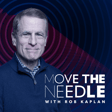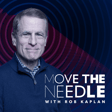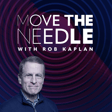
Kathleen Sebelius
This is Move The Needle with Rob Kaplan, where we talk to people who lead, innovate, and inspire. Today on Move The Needle, Rob talks with former Kansas governor and Health and Human Services secretary Kathleen Sebelius, who has spent her entire life in and around politics.
Kathleen Sebelius is one of America’s foremost experts on national and global health issues, human services, and executive leadership. As CEO of Sebelius Resources LLC, she provides strategic advice to companies, investors, and non-profit organizations.
Sebelius chairs the board of Humacyte and serves on the boards of directors of Devoted Health, Exact Sciences, Included Health, and the Kaiser Family Foundation. She co-chairs the Aspen Institute Health Strategy Group and serves on advisory boards for the Dole Institute of Politics, Solera Health, Out Leadership, the Estée Lauder Foundation, Protect Our Care, the University of Kansas College of Liberal Arts and Sciences, and Zipline. Sebelius is honorary co-chair and an advisor to the National Cannabis Roundtable.
From April 2009 through June 2014, Sebelius served in President Barack Obama’s Cabinet as the 21st Secretary of the Department of Health and Human Services, where she worked to pass and implement the Affordable Care Act. At HHS, Sebelius managed 11 operating agencies, 90,000 employees in 50 countries around the world, and a $1 trillion budget. Forbes named Sebelius one of the 100 most powerful women in the world.
Having served as Governor of Kansas from 2003 to 2009, Sebelius is the first daughter of a governor to be elected governor in American history; her late father, John Gilligan, was Governor of Ohio. Time magazine named her one of America’s Top Five Governors. Previous elected offices include two terms as the Kansas insurance commissioner and four terms in the Kansas Legislature.
Sebelius earned a master of public administration degree from the University of Kansas and a bachelor of arts degree from Trinity Washington University. She is married to Gary Sebelius, a retired federal magistrate judge. They have two married sons, Ned and John, and four grandchildren.
#kathleensebelius #kansasgovernor #kansaspolitics #HHS #healthandhumanservices #womeninpolitics #secretary #womaninbusiness #politicscareer #humacyte #globalhealth #nationalhealth #sebeliusresources #universityofkansas #washingtonuniversity #movetheneedlewithkathleensebelius #movetheneedlewithbrobkaplan #samzeff #robkaplan #scottrichardson #ronelgolden


